

ResearchED Curriculum - Filling The Pail. By some strange quirk, a review of the Australian Curriculum and a review of the New South Wales curriculum are both taking place at the same time.
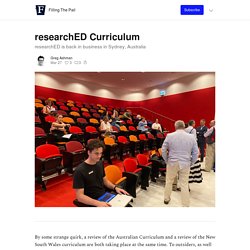
To outsiders, as well as many insiders, this is mystifying. If there is an Australian curriculum then how can there also be a separate curriculum in the Australian state of New South Wales? The answer is historical and the reality is that the New South Wales curriculum essentially fleshes-out and applies the Australian Curriculum to the New South Wales context. Reading about Curriculum – Occam's Hairdryer. I have spent a lot of time reading about curriculum over the last few years and it has radically changed the way I think about my job.
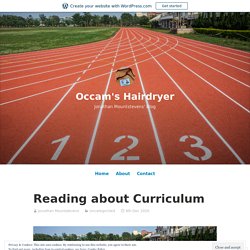
I have kept a list of the books, articles and blogs which have most influenced me as I have done so, and it seems silly not to share it in case it is of use to others. I have every intention of continuing to update it, but I should probably face reality and accept that I will only do so rarely. There is a definite secondary bias, which simply reflects my own experience and role. This list focuses on curriculum thinking in what might be characterised as the liberal tradition, because that is where my own views lie.
The ‘wicked problem’ of school improvement. – Walden Education (@WaldenKent) Why school improvement is a ‘wicked problem’ and how understanding may this help inoculate us against irrational responses to the latest Ofsted framework.
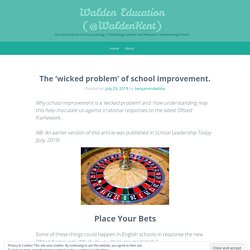
NB: An earlier version of this article was published in School Leadership Today (July, 2019). Place Your Bets. Ark Priory Primary Academy Curriculum Framework and Intent 19 20. National Institute for Excellence in Teaching. Connecting What to Teach with How to Teach It Research confirms what effective educators and policymakers know from practice: The implementation of a "high-quality" curriculum, aligned to rigorous state standards, leads to notable student learning gains.
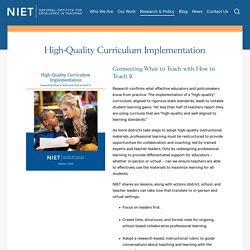
Yet less than half of teachers report they are using curricula that are "high-quality and well aligned to learning standards. " As more districts take steps to adopt high-quality instructional materials, professional learning must be restructured to provide opportunities for collaboration and coaching, led by trained experts and teacher leaders. Education technology has come of age. There's no going back. With the right planning and resources, online learning can be part of an offer that engages the whole community, writes Julian Drinkall Before lockdown, AET were already the largest user of Google classroom in the country, and I’m very proud that we have some preeminent experts in digital learning in our curriculum and technical teams.

But as soon as it became clear that schools were going to be in lockdown for quite some time, we put rocket boosters under this work. Book Lists for Stone Age to Iron Age. This engaging picture book tells the story of a boy who falls down a hole to find himself back in time 15,000 years.
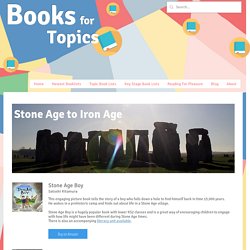
He wakes in a prehistoric camp and finds out about life in a Stone Age village. Stone Age Boy is a hugely popular book with lower KS2 classes and is a great way of encouraging children to engage with how life might have been different during Stone Age times. There is also an accompanying literacy unit available. Gratitude for the Curriculum – Kat Howard @saysmiss. I have come to regard the term ‘catch-up curriculum’ with a wary eye; my argument is one of balance, stability and poise.
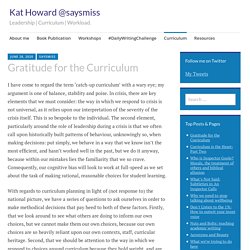
In crisis, there are key elements that we must consider: the way in which we respond to crisis is not universal, as it relies upon our interpretation of the severity of the crisis itself. This is so bespoke to the individual. The second element, particularly around the role of leadership during a crisis is that we often call upon historically built patterns of behaviour, unknowingly so, when making decisions: put simply, we behave in a way that we know isn’t the most efficient, and hasn’t worked well in the past, but we do it anyway, because within our mistakes lies the familiarity that we so crave. Subject associations. Curriculum: A Warning, Part 1 – Birmingham Teacher. ‘Curriculum’ is a lovely, concrete noun.
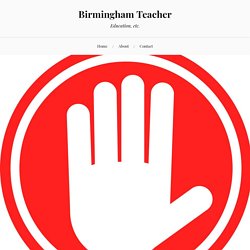
And, like concrete, it can be pretty hard to shift once it’s in place. So, in this post, I’m offering a warning before stuff that’s a bit rubbish becomes too embedded to move. A big, concrete caveat to counterbalance the big, concrete curriculum narrative that has, in some parts, started to warp. Global Schools.
Are curriculum intent statements for Ofsted or for pupils? I just searched Google for “curriculum intent statement” and it’s a truly depressing affair.
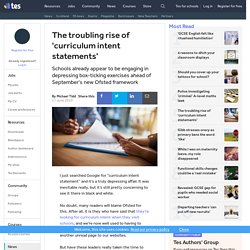
It was inevitable really, but it’s still pretty concerning to see it there in black and white. No doubt, many readers will blame Ofsted for this. After all, it is they who have said that they’re looking for curriculum intent when they visit schools, and we’re now well used to having to pre-empt most Ofsted questions by adding another unread page to our websites. But have these leaders really taken the time to consider what the intent of their curriculum is, or have they just decided to write something to tick the box?
I rather fear the latter. Opinion: 'Ofsted’s new framework? Wellbeing: Ofsted's framework: what it means for pupil mental health More from Michael Tidd: Where will all this extra schools funding go? Perhaps the more depressing result in the search is the half-day course on writing a curriculum intent statement to suit Ofsted. Why teach? It feels as if it is getting harder to answer this.
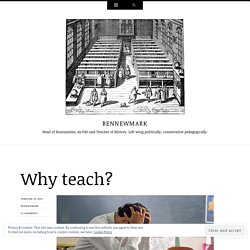
Year on year we fail to hit teacher training recruitment targets and lose more and more teachers to private family lives and other professions. As the number of childrenhew in our schools rises alarm feels increasingly like panic. There are many reasons for this. The familiar culprits of poor behaviour, crude accountability measures, falling wages and inflexible working conditions have probably all played a part. But there are more fundamental questions to answer too. Thinking About Curriculum. The problem with general ability statements in history education. Progression models are frequently constructed from ‘ability’ statements.
Put simply, if you have an ability, it means you can do something. It is therefore quite common to see progression models in history education containing statements saying “pupils can construct causal arguments” or “pupils can critique interpretations of the past”. The rationale behind this is not hard to see. As a history teacher, I want my pupils to become more able in the discipline. Expert historians spend their time constructing causal arguments and critiquing interpretations, and it would therefore seem to follow that a progression model for history education ought to contain ability statements about these disciplinary practices. How to revamp your primary curriculum. Broad. Balanced. Creating a ‘powerful knowledge’ curriculum in schools. Creating a ‘Powerful Knowledge’ Curriculum in Schools Introduction: James Frayne, Director of Policy, Policy Exchange Good evening everybody, and thank you for coming this evening to this discussion that we’re hosting in partnership with ASCL, continuing the series of events that we’re doing over the course of the next few weeks.
My name’s James Frayne, I’m Director of Policy here at Policy Exchange. A-knowledge-driven-school-10-things-to-remember. 166279-the-curriculum-and-the-entitlement-to-knowledge-prof-michael-young. Entitlement to knowledge - a privilege or a right? Why should knowledge not have a central place in the curriculum? Why has the term 'knowledge-based curriculum' become a derogatory term? These are simple enough questions, but indicate the polarised nature of curriculum debate in England. Curriculum Notes #1: Start out real, concrete, authentic. How not to misfire.. exploring the learning process with Henry VIII. Having written about lessons that mis-fire, I was asked to suggest what people should do instead. That’s a mighty big task because, what you might do depends on what exactly you want students to know and, in any specific example, there are countless possibilities. How to do well in the new Ofsted…
ProspectUs Curriculum > Themes. My_activity_passport_mobile_v1. SSAT 2nd curriculum conference. The fall and rise of educational orthodoxy – 2018 revisited – EduContrarian. Why curriculum matters: a response to Tim Oates, Dylan William and Daisy Christodoulou. Why the views of our leading educationalists on the curriculum don’t add up This is an expanded version of the talk that I gave at ResearchEd on 9 September 2017.
In it I argue that Tim Oates, Dylan Wiliam and Daisy Christodoulou, all educationalists whom I admire, have nevertheless got much wrong in their account of the curriculum. 14,000 words. You can bookmark individual slides by right clicking on the “SLIDE X” caption and selecting “Copy link address”. Slides can be enlarged by clicking on the slide. Aims. Central to the proposals of the Cambridge Primary Review is a set of twelve aims for primary education. Their adoption and pursuit was one of the eight priorities of the Cambridge Primary Review Trust. The aims are grounded in extensive evidence from parents, teachers, children, community leaders, international research and a wide range of official, professional and voluntary stakeholders.
Burnett-report-20160720. FINAL-VERSION-Carol-Robinson-Children-their-Voices-and-their-Experiences-of-School. In praise of a prosaic curriculum. In case you’ve been living in an underground bunker for the last year or two, the curriculum is now a thing. More than that, it’s the next big thing in education. The new framework for inspection arriving in our schools from September 2019 will have the quality of the curriculum firmly in its sights.
Intent, implementation and impact are set to become our new lodestar, possibly (fingers crossed) eclipsing sats and GCSE results at the centre of the school solar system. Amanda Spielman has made it quite clear, mistaking ‘badges and stickers’ [the performance table success that comes with having great data] for learning and the substance of education, is a mistake, and one, presumably, that the new framework will seek to overcome. I do not under-estimate the massive culture shift involved, for both inspectors and schools. That Curriculum Thing.
In praise of a prosaic curriculum. UCPS-Curriculum-Design-Statement. 7 Principles of Curriculum Design by Amrita Tejpal. The curriculum should be designed on the basis of the following seven principles: Challenge and enjoymentBreadthProgressionDepthPersonalisation and choiceCoherenceRelevance. The principles must be taken into account for all children and young people.
They apply to the curriculum both at an organisational level and in the classroom and in any setting where children and young people are learners. The principles will assist teachers and schools in their practice and as a basis for continuing review, evaluation and improvement. They apply to the curriculum at national, education authority, school and individual levels and must be taken into account for all children and young people Although all should apply at any one stage, the principles will have different emphases as a child or young person learns and develops. Four pillars of principled curriculum design, to articulate and evidence curriculum intent. A glimpse into Ofsted’s thinking on the curriculum and its implications for schools in 2019. Doing fewer things in greater depth: How we reduced teacher workload by restructuring our approach to planning. - Teaching.
At St Peter’s Primary school, North Somerset, we have long been looking into ways in which we can try to reduce teacher workload. We began our journey by reading the teacher workload review group paper 'Eliminating unnecessary workload around planning and teaching resources' and agreed with many of its principles. As a large school, we support our teachers to plan collaboratively in year groups, placing planning at the heart of our teaching. The 3D curriculum that promotes remembering – primarytimerydotcom. In my previous blog I explained about how memory works, and how teachers can use strategies from cognitive science such as retrieval practice to promote long term learning. After all, the learned curriculum is the only curriculum that actually counts in the end. The curriculum is the means by which we ensure that all our children get their fair share of the rich cultural inheritance our world affords.
How to improve the school results: not extra maths but music, loads of it. Abiha Nasir, aged nine, walks quietly into the small classroom, takes a seat, adjusts her hijab and picks up the drumsticks. Primary BSW 2017 Activity Packv2. Diagnostic questions - a formative assessment tool - UYSEG. Many of the questions and tasks we have been developing in the York Science project can be described as ‘diagnostic’.
That is, they do not only tell you which students have some understanding of the idea we are thinking about, they also give you some information about the misconceptions of those who do not use the accepted scientific explanation. This is what really happens to the plastic bottle you throw away. The Great Illustrated Encyclopedia. Dereliction! A History, Geography, Art collaborative enquiry. John Martin ‘The destruction of Pompeii and Herculaneum Outline. Curriculum_map_year_5-6_autumn_2012%281%29.